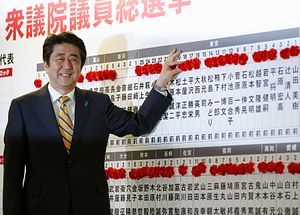It seemed an odd time, on the face of it, to call an election. With two years still to run on his four-year term, Japanese Prime Minister Shinzo Abe was coming off a difficult autumn. His signature policies were largely unpopular. The ruling Liberal Democratic Party (LDP) candidate in the Okinawa gubernatorial election had just been defeated, complicating an interminable issue involving the relocation of a U.S. military base. Two members of his Cabinet had recently resigned over campaign finance scandals. His own approval ratings were falling. Most importantly, his signature program for reviving the Japanese economy, known as Abenomics, had been derailed by a disastrous consumption (tax) hike in April, and Japan was back in recession. Surely, then, better to wait?
Abe’s proffered reason for going to the polls was the need for a mandate to postpone the next increase in the consumption tax, originally scheduled for the end of 2015, by 18 months. Given that the vast majority of the country clearly wanted no truck with another tax hike in the foreseeable future, that excuse was unsurprisingly greeted with skepticism. No, the election was a political calculation. Such was the disarray of Japan’s opposition, Abe realized that even with all the bad news, he was still the only game in town. A snap election would more than likely produce record low turnouts, heavily favoring the LDP’s formidable party machine, and Abe would retain his large majority. It would in many respects be a repeat of the 2012 elections, when voter disgust saw millions stay home and Abe enjoy a thumping victory despite the LDP receiving more than a million votes fewer than it had in 2009, when it was soundly defeated. In short, Abe would ride the coattails of voter apathy to another four years.
And so it proved. When the votes were tallied after the December 14 election, the LDP had won 291 of the 480 seats in the Japanese Diet, down slightly from the 294 it held going into the election but still a very convincing majority. With its coalition partner New Komeito, the LDP also retained its two-thirds majority in parliament. The main opposition party, the Democratic Party of Japan, still reeling from the spanking it received in 2012 after three chaotic years in government, was able to make some modest ground, improving from 62 seats to 73, although the party’s uninspiring leader Banri Kaieda lost his seat. The Japanese Communist Party – often the party of choice for protest voters – also picked up seats, from 8 to 21. The Party for Future Generations, led by far-right former Tokyo Governor Shintaro Ishihara, had a disastrous election, falling from 20 seats to just two. As expected, voter turnout was easily the lowest on record, at 52 percent, compared to the previous record low of 59 percent in 2012. Heavy snow in Western Japan didn’t help.
































